Text
Multi-disciplinary panels to discuss research that advances Toward Science Without Walls.
AAAS is committed to making the Annual Meeting an inclusive space for sharing ideas and knowledge. See our meeting policies and help us foster a safe space for all. Follow the conversations with the hastags #AAASmtg
2024 AAAS Annual Meeting takes place in Denver, CO, February 15-17. Plenary sessions and Sci-Mic Stage Chats will be streamed live. See schedule and tune in!
Annual Meeting program
Scientific Sessions: Science and technology experts assemble in small multi-disciplinary panels to discuss research that advances Toward Science Without Walls. During these 60-minute sessions, a panel of three speakers give 10-minute presentations followed by audience questions and comments.
Lightning Talks: Early career researchers take the stage for ten minutes to discuss their STEM work.
Workshops: Workshops are aimed at individuals seeking careers in science and engineering. Workshops are instructional and interactive in nature and are markedly different from a scientific session. Workshops may have up to 3 presenters and will be 60 minutes in length.
SCIENTIFIC SESSION, WORKSHOP, AND LIGHTNING TALK TIMELINE
March 5; 2024 theme is announced, and session submission site opens.
May 4; Deadline to propose Scientific Sessions, Workshop, and Lighting Talks.
May 15; Session proposal review begins with volunteer session reviewers.
July; Program Committee meets for the final review to select Scientific Sessions, Workshop, and Lighting Talks.
Mid-August; Scientific Session and Lightning Talk organizers receive accept/decline notifications.
Mid-August; Workshop coordinators receive accept/decline notifications.
Mid-October; 2023 Annual Meeting program and registration available online.
February 16-17; Scientific Sessions, Workshop, and Lighting Talks take place at the 2024 AAAS Annual Meeting.
The session and workshop timeline is updated as of September 13, 2023.
#science and technology#scientific research#precision medicine#scientists#medical sciences#annual meeting#aaas#Scientific Sessions#Workshop#lighting talks#Science Without Walls#workshops#multi-disciplinary panels
0 notes
Text
Explore problems, consider solutions, and envision science without walls.

youtube
Science and technology would proceed faster and better in an ecosystem free of barriers that currently separate us by discipline, approach, institution, nation, access, wealth, seniority, race, and gender; we shall AAAS Annual meeting- Towards science without walls.
AAAS Annual meeting "Towards science without walls".
February 15-17 2024
0 notes
Text
Towards science without walls.
Theme of the 2024 AAAS Annual Meeting is "Toward Science Without Walls."
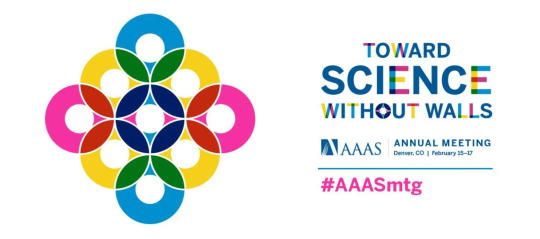
Keith Yamamoto is vice chancellor for science policy and strategy, director of precision medicine, and professor of cellular and molecular pharmacology at UCSF. He is the AAAS President and Chair of the Meeting presents the theme of the 2024 AAAS Annual Meeting: Toward Science Without Walls. Video includes opening remarks by Gilda Barabino, Colorado Governor Jared Polis, and Thomas Cech.
Watch the livestream!
#AAASmtg#science advancement#annual meeting#science without walls#science policy and strategy#precision medicine#cellular and molecular pharmacology
0 notes
Text
How will plants adapt to a high CO2 world? - IUBS Centenary Webinar Series.
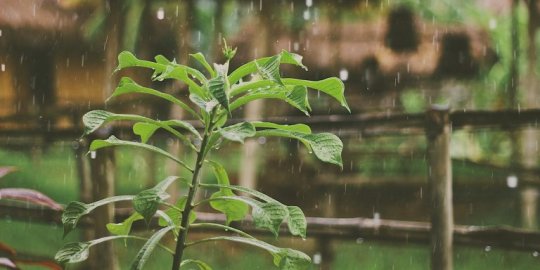
ISC Member, the International Union of Biological Sciences (IUBS), is inviting to the fifth lecture in the frame of the IUBS Centenary Webinar Series, which will be delivered by Christine H. Foyer, Scchoolof Biosciences, College of Life and Environmental Sciences, University of Birmingham, UK.
Climate change is the defining issue of our generation. In this presentation, I will introduce the topic of climate change, the greenhouse effect and greenhouse gases, covering photosynthesis and its importance in ecosystems, particularly in relation to the carbon dioxide fertilisation effect and nature-based solutions to climate change. I will discuss how scientists measure the impact of high atmospheric carbon dioxide concentrations in crops and forests using Free-Air Carbon dioxide Enrichment (FACE) sites. I will use two examples: the FACE site in Urbana USA that focusses on crops and the Birmingham Institute for Forest Research (BIFoR) FACE site that studies how forest ecosystems will respond to future increases in atmospheric carbon dioxide. I will discuss some of the results obtained to date and their implications for society and the UK roadmap to net zero.

Speaker
Prof. Christine H. Foyer is one of the most successful plant physiologists worldwide and has been working for many years in the fields of environmental stress adaptation and photosynthesis. She describes her own lecture in a brief abstract:
Climate change is the defining issue of our generation. In this presentation, I will introduce the topic of climate change, the greenhouse effect and greenhouse gases, covering photosynthesis and its importance in ecosystems, particularly in relation to the carbon dioxide fertilisation effect and nature-based solutions to climate change. I will discuss how scientists measure the impact of high atmospheric carbon dioxide concentrations in crops and forests using Free-Air Carbon dioxide Enrichment (FACE) sites. I will use two examples: the FACE site in Urbana USA that focusses on crops and the Birmingham Institute for Forest Research (BIFoR) FACE site that studies how forest ecosystems will respond to future increases in atmospheric carbon dioxide. I will discuss some of the results obtained to date and their implications for society and the UK roadmap to net zero. Register
#Free-Air Carbon dioxide Enrichment (FACE)#Atmospheric sciences#International Science Council (ISC)#webinars#ecological sciences#biological sciences#climate sciences#net zero#International Union of Biological Sciences (IUBS)
0 notes
Text
PANAM Physiological Sciences 2023.
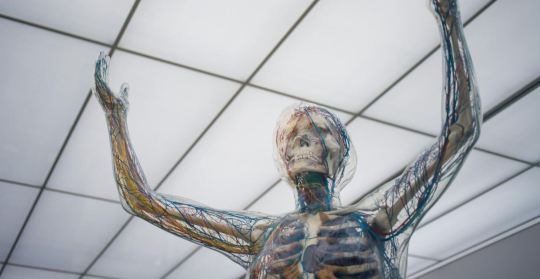
The Pan-American Physiological Sciences 2023 (PANAM Physiological Sciences 2023) is the major scientific meeting in physiological and medical sciences for the Americas for 2023. This meeting is held every four years, and 2023 meeting in Chile follows 2019 in Habana, Cuba, and 2014 in Foz do Iguaçu, Brazil.
General topics will cover systems physiology & pathophysiology, cardiovascular diseases, immunology & cancer, diabetes mellitus, obesity, hypertension, respiratory and neurophysiology, free radicals & oxidative stress, vascular physiology & pathophysiology, muscle physiology & pathophysiology, renal & gastrointestinal physiology, biochemistry & biophysics behind physiology, pregnancy & programming of diseases, preterm birth, diabetes and obesity in pregnancy, endocrine & metabolism, BigData & AI in physiology, translational medicine and basic sciences, education in physiology, and lab-work in physiology.
For this event, the 2023 annual meetings of SCHCF and ALACF will coincide with PANAM Physiological Sciences 2023, taking place at the Enjoy Hotel Puerto Varas.
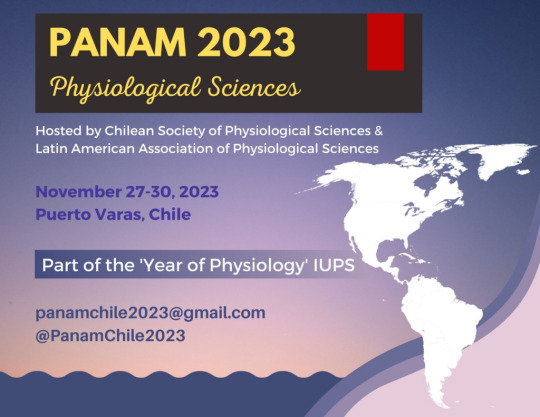
#Physiological Sciences#medical sciences#meetings#Year or Physiology#physiology#IUPS#basic sciences#lab-work#chile
0 notes
Text
2nd international symposium on plastics in the Arctic and Sub-Arctic Region.
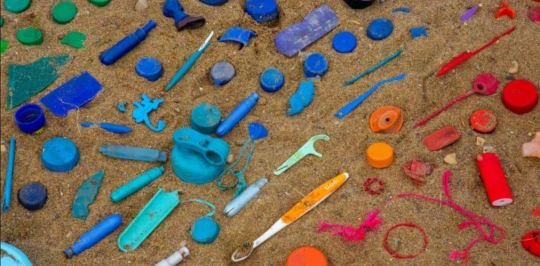
Scientific research and studies into plastic pollution have been growing quite fast over the last couple of decades. It is essential that we take full advantage of the best available knowledge when we look for solutions to tackle this global problem. In March 2021, Iceland and the Nordic Council of Ministers hosted a successful First symposium on Plastics in the Arctic and Sub-Arctic Region with participants calling for a follow up in the near future.
For these reasons, the Government of Iceland, with the support of the Nordic Council of Ministers, will host a Second International Symposium on Plastics in the Arctic and Sub-Arctic Region at Harpa, Reykjavík Concert Hall and Conference Center, on 22-23 November 2023. The aim is to gather scientific, Indigenous and local knowledge on plastic pollution and discuss ways and means to reduce the impact of plastics on Arctic ecosystems.
REGISTER
The Government of Iceland has already received confirmation from the following organizations and institutions to become partners in the event. These are the International Council for the Exploration of the Sea (ICES), the Oslo and Paris Commission (OSPAR), the International Oceanographic Commission (IOC) of UNESCO, the University of the Arctic (UArctic), the International Arctic Science Committee (IASC) the Polar Institute of Wilson Center, GRID-Arendal, the Center for the Ocean and the Arctic, UiT the Arctic University of Norway and the Nature Institute of Greenland. Iceland is interested in extending the collaboration and partnership in the symposium and will welcome additional partners for the event. The symposium is being held with financial support from the Nordic Council of Ministers.
The planned symposium will build on the foundation of science of the first symposium and produce information and advice for decision makers. The symposium aims for exchange of views and updates of knowledge from various sources. The symposium will evaluate the present extent and nature of plastic pollution in the Arctic and Sub-Arctic regions and discuss its impact on ecosystems and communities. The origin of plastic litter, how it is transported to or in the Arctic and Sub-Arctic region and how breakdown processes are affecting the status of pollution will also be addressed.
Finally the symposium will focus on possible mitigation methods and how they can be implemented and provide useful input to the ongoing negotiations on an international agreement on plastic pollution, and to other ongoing relevant international work to support protection of the marine environment.
A high-level scientific steering committee has been established to assist in developing the program of the symposium.
Conference themes
Monitoring and assessment of plastic pollution in the Arctic.
Methodological developments to determine macro, micro and nano plastics.
Sources and transport of plastic in the Arctic and sub-Arctic.
Impacts of marine litter in the Arctic (environmental, economic and social).
Arctic challenges and solutions for improved waste management.
Tackling plastic pollution: international collaboration, policies, best practices and novel developments from around the world.
Marine litter, particularly when made of plastic, is one of the more challenging problems affecting the marine environment globally. Plastics account for 72% of all marine litter in the world ocean.
Register to participate to the 2nd international symposium on plastics in the Arctic and Sub-Arctic Region.
#Marine litter#challenging problems#marine environment#Ocean sciences#environmental science#Arctic#sub-Arctic#symposium#Nordic Council of Ministers#scientific research#plastic pollution#climate sciences
0 notes
Text
Beyond the Microscope: Cryo-EM’s Impact on Accelerating Drug Discovery.
A collaboration between the U.S. National Committees on: Crystallography, Chemistry, CODATA & the Board on Chemical Sciences and Technology.
As part of Advancing Drug Discovery: A Webinar Series of the National Academies of Sciences, Engineering and Medicine, a session on Beyond the Microscope: Cryo-EM’s Impact on Accelerating Drug Discovery will be held on Thursday, November 16th, 2023 at noon (EDT). The 60-minute session will consist a presentation from Sandra Gabelli, Head of Structural biology at Merck & co and formally Executive Director of Protein and Structural Chemistry.
Over the past decade, single particle cryo electron microscopy (cryoEM) has transitioned from a niche technique to a powerful tool for structural biology. This is due, in part, to technological breakthroughs which have made it relatively routine to achieve near molecule formulations for protein targets of pharmacological interest in complex with drug candidates. The pharmaceutical industry has historically relied heavily on X-ray crystallography to enable structure-based drug design (SBDD); however, today cryoEM is playing an ever-increasing role in that process, especially for challenging samples like large multimeric complexes, proteins that are flexible, or proteins that are difficult to express or purify. Dr. Gabelli will describe the strategy and present examples were cryoEM has impacted the pipeline at Merck by enabling biology, guiding SBDD, driving protein engineering of biologics and impacting small molecule formulations with micro ED. Dr. Gabelli will also explore the potential offered by upcoming technological advancements of the technique.Register

#X-ray crystallography#structure-based drug design (SBDD)#cryoEM#technological advancements#biological sciences#molecule formulations#medical sciences#strutural biology#Chemical Sciences and Technology#pharmaceutical
0 notes
Text
2023 Vocabulary Symposium: FAIR Vocabularies For All.
Following on from the success of the 2022 Vocabulary Symposium, the ARDC invites you to the 2023 Vocabulary Symposium on 14 and 15 November 2023.
This is a 2-day hybrid event bringing together people from domains across disciplines spanning research, government and industry, including those from the ARDC Thematic Research Data Commons. The aim is to communicate and promote approaches to using, developing, publishing and maintaining vocabularies. The event will cover Australian and international initiatives that demonstrate the impact and value of FAIR vocabularies for maximising the reuse value of data within and across domains.
The program for the Symposium is out now. The Symposium will feature keynote presentations from:
Arofan Gregory, a standards expert at CODATA, who will present on “Controlled Vocabularies in a Changing Metadata Landscape”.
Jen Drysdale, a cultural heritage informatics and analytics specialist at the National Film and Sound Archive of Australia, who will discuss “The Role of Vocabularies in Cultural Heritage and the Impact of New Strategic Drivers”.
Register to participate!

#Vocabularies#computer science#National Film and Sound Archive of Australia#Cultural heritage#australia#Symposium#hybrid events#formal science#International science council (ISC)#scientific research
0 notes
Text
Celebration of World Science Day for Peace and Development 2023 – Building Trust in Science at the Nexus of Science, Policy and Society.
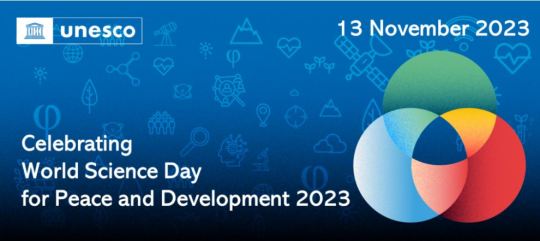
High-level roundtable on the occasion of 2023 World Science Day for Peace and Development.
The 2023 celebration of the World Science Day for Peace and Development, will be hosted at UNESCO Headquarters in Paris on 13 November from 6:30 p.m. – 8:00 p.m. CET, in the margins of the 42nd session of the General Conference of UNESCO.

This year’s celebration of the Day at UNESCO will focus on “Building Trust in Science” and will include:
A high-level roundtable on “Building Trust in Science at the Nexus of Science, Policy and Society”, which will explore different approaches and strategies contributing to building and preserving trust in science, featuring the ISC’s Centre for Science Future’s new paper, The Contextualization Deficit: Reframing Trust in Science for Multilateral Policy and
The 2023 Award Ceremony of the UNESCO Kalinga Prize for the Popularization of Science.
#scientists#unesco#world science day for peace and development.#Klainga prize#Trust in science#panel discussions#conferences
0 notes
Text

Second Conference on Academic Freedom in the Americas.
Despite the growing recognition of the importance of academic freedom for free and democratic societies, higher education is under constant threat in the Americas. This includes the political control of higher education institutions, the use of force on campuses and in university facilities, administrative and criminal legislation aimed at silencing academics, ideological censorship of academic discourse and limitations on freedom of research and expression, and impunity with respect to sexual violence in university spaces throughout the hemisphere.
The Second Conference on Academic Freedom in the Americas will feature panels on academic freedom and contributions that highlight challenges and opportunities in protection, advocacy, litigation and best practices in academic freedom and university autonomy. It will also serve as the global launch of Scholars at Risk’s Free to Think 2023 report.Register and view programme
About the Free to Think 2023 Report

Free to Think 2023 analyzes 409 attacks on higher education communities in 66 countries and territories. These attacks occurred in the context of authoritarian entrenchment and democratic backsliding, and governments increasingly used their regulatory power to constrain higher education and limit university autonomy, academic freedom, and free expression on campus.
During the past year, Iranian authorities violently suppressed student and scholar participation in the “Women, Life, Freedom” protest movement. The Taliban took the extraordinary step of barring women from higher education and then brutally repressed the public opposition to those restrictions. Government crackdowns on dissent reinforced cultures of fear and self-censorship in Russia, China, and Turkey. Universities in Myanmar, Sudan, and Ukraine are on the frontlines of conflict as militaries and other armed groups have damaged and occupied facilities. In the United States, lawmakers have sought to restrict teaching and research related to disfavored topics and have undermined university autonomy.
These are just a few of the concerning developments in Free to Think 2023. Together, they document a global phenomenon that not only harms individuals, but also shrinks the space for discourse and sharing ideas. These attacks harm all of society and they must stop.
Scholars at Risk calls for global action in defense of academic freedom and urges states, higher education communities, civil society, and the public to respond: to help protect scholars, students, and higher education institutions; to help protect everyone’s freedom to think, question, and share ideas.
#academic freedom#scholars#freetothink#higher education#panel discussions#International Science Council (ISC)
0 notes
Text
Sea, Sky, And Land: Engaging In Solidarity In Endangered Ecologies - Annual Meeting of the Society for Social Studies of Science (4S)
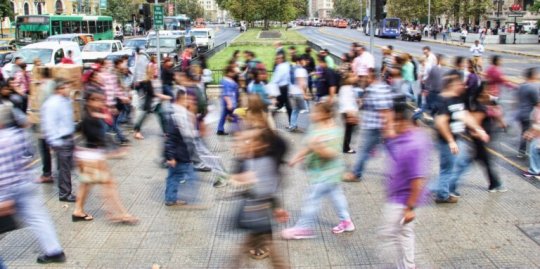
The 4S annual meeting 2023 will be held from 8 – 11 November in Honolulu, offering “sea, sky, and land” as metaphors and materialities with which to think about how to live with and revitalize harmed bodies, maligned ecologies, and strained societies. In the midst of settler colonialism, we focus, for example, on the solidarity of Kānaka Maoli with Asian Americans, to address water issues in Hawaiʻi and around the world. Or, to interrogate the problems created when Hawaiʻi is used as a base of military operations to control politics across the Pacific and beyond. We embrace 4S’s long-standing commitments to social and environmental justice across overlapping and diverse intellectual communities to encourage innovative contributions attentive to the problems of dwelling in polluted waters, colonized landscapes, and militarized spaces; of air-born transmission and breathing in asphyxiating economies; or of speaking through undersea cables, underground data centers, and online systems. We welcome STS insights into technoscientific practice and knowledge, the nature of expertise, and whose knowledge claims count and how. We invite you to gather in Honolulu to think and learn about how we care and connect in endangered times.
As we gather in Honolulu, we recognize Kānaka Maoli, their allies, and the devastating effects of militarism, colonialism, overtourism, and racial capitalism. We seek to work in solidarity with those who have suffered from various forms of injustice. Experiences of Kānaka Maoli in Hawaiʻi and indigenous people around the world focus our consciousness on struggles over land, water, and bodies and on how science, technology and knowledge—central concerns for 4S—are integral to oppression and marginalization.
#social sciences#humanities#Society for Social Studies of Science#Honolulu#ecology#environmental science#environmental protection#atmospheric sciences#natural sciences#conferences
0 notes
Text
Science Pathways Festival 2023: Reframing Success.
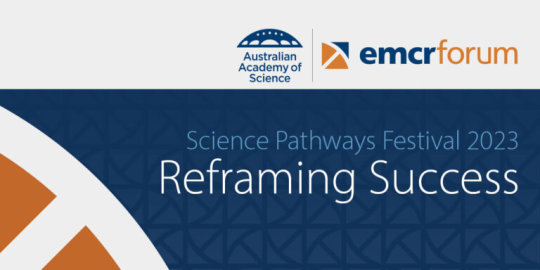
The Science Pathways biannual conference will be organized by the EMCR Forum with the support of the Australian Academy of Science with a topical theme and a brand new, inclusive and sustainable format.
The Science pathways Festival 2023 will be held from 06 November 2023 to 28 November 2023, to view the full schedule please visit this link.
The seventh edition of Australia’s premiere conference for professional development in STEM promises to be an unforgettable experience.
Delivered virtually, Science Pathways Festival 2023: Reframing Success will bring together the brightest minds and boldest thinkers from all corners of the country to unravel the secrets to a successful career in science.
Over the entire month of November 2023, a range of workshops, panel discussions, and professional development sessions will leave you inspired and ready to conquer society’s greatest challenges.
Don’t miss out on this unique opportunity. The countdown to Science Pathways Festival 2023: Reframing Success has begun!
For the full program, more information and to register, visit the event website.
#Science pathways Festival#Reframing Success#brightest minds#boldest thinkers#career in science#STEM#workshops#panel discussions#professional development sessions#Australia#Australian Academy of Science#International Science Council (ISC)#webinars#EMCRforum
0 notes
Text
Reflecting the current challenges and debates in science and society - Berlin Science Week 2023; November 1-10th.

Berlin Science Week from 1-10 November 2023 combines in-person, online and hybrid events. Our focus is on exchange and reflection: the programme is based on interactive and often interdisciplinary formats ranging from panel discussions, workshops, exhibitions, to VR-experiences, film screenings, music installations and much more. Internationally renowned scientists and institutions contribute to topic tracks reflecting the current challenges and debates in science and society.
#Science Week#Berlin#panel discussions#workshops#exhibitions#scientists and institutions#world science day for peace and development.#International Council on Science (ICS)
0 notes
Text
Strengthening scientific research.

UNESCO Chairs Seminar 12: Strengthening Scientific Research.
Date/Time: 13 December 2023 - 2:00 pm - 13 December 2023 - 3:30 pm.
Location: UNESCO Headquarters, Paris, France.
Rooms : Room VII.
Transforming science for greater inclusion.
youtube
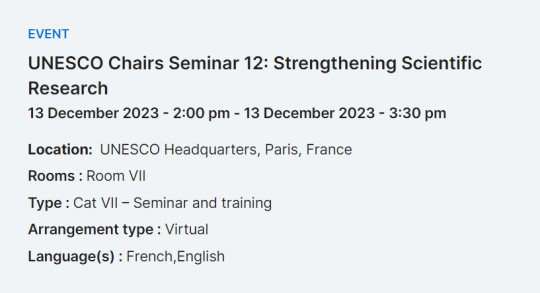
Recommendation on Science and Scientific Researchers.
For science to benefit everyone equally, we need to transform science ecosystems. UNESCO’s 2017 Recommendation on Science and Scientific Researchers (RS|SR) provides a vision for science that goes beyond growth and productivity and puts human wellbeing and inclusion at the centre.
Science with its remarkable breakthroughs can facilitate access to and improve the quality of basic services – from health, water and food, to education, cultural life and information – drastically reducing inequalities within and across countries. It can help address current and future challenges such as climate change and health emergencies. Making this possible will require a paradigm shift: justice, inclusion and human rights must become the cornerstone of the science ecosystem.
The RS|SR defines the vision and provides the operational guidance for such transformation.
Enabling women and girls to follow a career in sciences;
making scientific applications accessible to all;
providing the conditions for scientists to work in freedom and safety;
favouring trust and a science culture in society; and
ensuring science-led policymaking
are some of the Recommendation’s building blocks.
#Seminars#UNESCO#scientific research#natural science#science#scientists#science ecosystem#science-led policymaking#Youtube
0 notes
Text
Catalyzing Transformative Change: Science, Academia and the Journey to 2030.
The objective of the side-event is to identify and promote concrete opportunities and partnerships for science and academia to accelerate transformations in high impact areas for implementing the 2030 Agenda for Sustainable Development.
Lead Facilitators:
UN DESA, in collaboration with:
Sustainable Development Solutions Network (SDSN)
International Science Council (ISC)
World Meteorological Organization (WMO)
United Nations Development Programme (UNDP)
Representatives of the Secretary-General's 10-Member-Group of High-level Representatives of Civil Society, Private Sector and Scientific Community to support the UN Technology Facilitation Mechanism
The 2030 Agenda for Sustainable Development stands as a ground-breaking global roadmap for addressing the most pressing challenges facing humanity. At the half-way point to 2030, science, technology and innovation hold enormous promise for enabling the kinds of transformations needed to accelerate progress on the Sustainable Development Goals (SDGs) –in energy systems, food systems, education, digital infrastructure, just economies, nature and the global commons and other crucial areas as indicated in the Special Edition of the SDG Report and the Global Sustainable Development Report. Addressing institutional and other barriers to knowledge and technology sharing and revolutionizing science, technology and innovation (STI) for sustainability can support a global enabling environment for the SDGs complementing financial reforms and a surge in SDG financing.
The objective of the event is to identify and promote concrete opportunities and partnerships for science and academia to accelerate transformations in high impact areas for implementing the 2030 Agenda for Sustainable Development. By bringing together policymakers, researchers, academics, and other stakeholders, the event will foster dialogue, share best practices and identify actionable strategies to advance the implementation of the SDGs. The event will also aim to help advance commitments in the SDG Summit Political Declaration for bridging the science, technology and innovation divides and supporting the responsible use of science, technology, and innovation as drivers of sustainable development.
---
To maximize the SDG Summit's impact, the Secretary General is convening an SDG Action Weekend, which will generate opportunities for stakeholders, UN entities, and Member States to convene inside the United Nations Headquarters and set out specific commitments and contributions to drive SDG transformation between now and 2030.
The SDG Action Weekend will consist of the SDG Mobilization Day on Saturday, 16 September, and the SDG Acceleration Day on Sunday, 17 September at UNHQ in New York.
The SDG Mobilization Day (16 September) will create an opportunity for stakeholders from all sectors to convene inside the United Nations Headquarters and mobilize towards an ambitious SDG Summit and UN General Assembly High-Level Week.
The SDG Acceleration Day (17 September) will be centred around the UN High-Impact Initiatives
The SDG Summit on 18-19 September will mark the mid point of the SDGs. It must secure the breakthroughs and momentum needed to change course and achieve the SDGs by 2030. To maximize the Summit's impact, the Secretary General is convening an SDG Action Weekend, which will generate opportunities for stakeholders, UN entities, and Member States to convene inside the United Nations Headquarters and set out specific commitments and contributions to drive SDG transformation between now and 2030.
#revolutionizing science#technology and innovation (STI)#knowledge and technology sharing#Sustainable Development Solutions Network (SDSN)#International Science Council (ISC)#United Nations Development Programme (UNDP)#World Meteorological Organization (WMO)#Partnership for science#science#academia#sdg4#stakeholders#SDG Action#agenda 2030#responsible use#innovation#plenary sessions
0 notes
Text
Briefing on Science-based Evidence in support of Sustainable Solutions - General Assembly, Informal meeting, 77th session.
The United Nations General Assembly President to convene the second science-based briefing to Member States. Eminent scientists and academics to brief United Nations General Assembly on beyond GDP; food security and sustainability transformation; and a scientific support system for the UN.
Description
Opening by H.E. Mr. Csaba Kőrösi, President of the General Assembly
Panel 1 - Beyond GDP
Panel 2 - Food security and sustainability transformation
This is the second informal plenary meeting of the General Assembly (the first one took place on 7 February 2023) organized by the President of the General Assembly to hear briefings from eminent scientists and academics to hold impact-oriented consultations with the scientific community and bring their contributions to the General Assembly.
The briefings, open to Members States, Observers of the General Assembly and ECOSOC- accredited NGOs, will focus on science-based evidence in support of sustainable solutions.
The briefings will be held in separate sessions. Each session's introductory part will be followed by an interactive discussion.
#scientific community#scientists#interactive discussion#united nations general assembly#plenary session#Sustainable Solutions#Science-based Evidence#Food Security
0 notes
Text
Draw attention to the challenges faced by science and raising support for scientific endeavours.

Objective IV of theWorld Science Day for Peace and Development.
#scientific endeavours#Raising support#Fields of Science#Scientists#Scientific challenges#chemistry#physics#natural science#astronomy#space sciences#medical sciences#digital sciences#unesco
0 notes